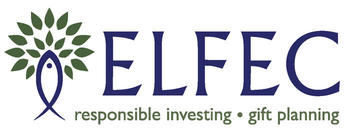
Elinor James was in a bind. She just did not know what to do. Every year, Elinor had given a sizable donation to her church – this was just who she was. She also knew the congregation counted on that donation to be able to carry out their mission in their small community. But this year, things were a little different. You see, Elinor dearly wanted to take her son and his family on a trip for her 70th birthday. But that meant that her available cash was a little low, and giving her normal donation to the church would make it difficult for her to meet some other obligations as well. What to do?
Elinor shared her concern with her pastor. Luckily, the pastor at Saints by the Sea Lutheran Church had just attended a planned giving seminar hosted by ELFEC. He knew there were other ways Elinor could make her donation that would help both her and her congregation. He told Elinor about the option of donating publicly traded securities, often called “Donations in Kind”. The investments are transferred directly to the charity, instead of cash from selling the units. He was also able to share with Elinor that there can be a significant tax advantage, depending on her specific circumstances. He encouraged her to go and speak to her financial planner.
When Elinor met with her financial planner, she learned that capital gains on non-registered investments (i.e not RRSP or RRIF funds) have a built-in tax liability that is triggered when they are disposed of by sale, gift, or death of the owner. The only exemption from that liability is provided by a charitable donation of the investment. To take advantage of the tax benefit, the donation has to be in-kind – meaning there is a transfer of the shares themselves. Together they were able to determine which of Elinor’s publicly traded securities presented the best gifting opportunity.
But that is not all. How could this transfer of securities take place? Like most congregations, Saints by the Sea Lutheran Church was not able or prepared to accept a direct transfer of investments, as the receiving charity must have a brokerage account to accept the transferred investments. Again, the pastor was able to help out, by pointing her and her financial advisor to the “Charitable Donation Securities In-Kind” form on the ELFEC website. It had all the information required to ensure that Elinor’s donation was handled smoothly.
How did this work? Donating publicly traded securities, (bonds, stocks, mutual funds) which have increased in value, is a tax efficient way to donate versus a cash gift. The following chart outlines the difference between donating the shares directly and a cash gift.

What are the benefits to the church and to Elinor?
- Elinor is able to make her regular contribution to the church AND go on her family trip
- Elinor is exempt from paying income tax on the capital gains of securities which are donated to Canadian charities
- It was more tax efficient for Elinor to donate shares than cash
- Elinor was also able to benefit from a charitable donation receipt in the amount of the current fair market value of the shares
- ELFEC assisted in making the transfer easy and seamless for both Elinor and Saints by the Sea Lutheran Church
- Saints by the Sea received their donation, which benefitted their ministry programs.
A Few Practical considerations
- The example listed above is simply an illustration. Actual tax advantages will differ by province, the amount of the capital gain, and the individual’s tax rate.
- It is important for the donor to consult with their tax advisor or financial advisor before proceeding. They can advise which investment offers the best gifting opportunity.
- Only appreciated securities (those with capital gains) benefit from this incentive (part of your non-registered investment account, not your “registered funds” – RRSP or RRIF – account)
- Securities must be transferred ‘in-kind’. There is no tax advantage to the donor to sell the securities first and donate the cash.
- The receiving charity must have a brokerage account to accept the transferred investments.
- If a congregation doesn’t have a brokerage account, ELFEC can help. We will handle the administration of the transfer (which can be time-consuming and tricky), forward the proceeds to the congregation, and even provide the donation receipt, all for a small ($125) fee. No other organization we know of does it for less.
Something you can do right now
Educate and encourage the people in your congregation about the benefits of donating non-registered publicly traded securities by placing the following announcement in your bulletin or newsletter. Making this information available helps your members individually and benefits the congregation’s ministries.
Gifts of Securities - Did you know that by transferring publicly traded securities to our congregation, you will experience a greater tax advantage than by donating the same amount in cash? You also assist in your congregation’s ministry programs. For more information, visit ELFEC at “Gifts of Securities”.
For more information about Lutheran Planned Giving or ELFEC, please feel free to contact me. I look forward to speaking with you.

Kathryn Smith | Giving Advisor | ksmith@elfec.ca | 1-888-308-9461
